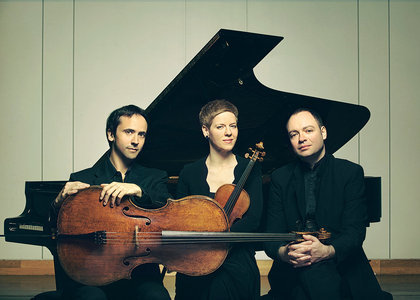> Vote for the best classical album of 2015

Schumann on Period Instruments - Album Review, 13th October
If you would like to vote for this cd please vote HERE
Launched under the Harmonia Mundi label, this album contains two widely known works - the stigmatized Violin Concerto in D Minor, dedicated by Schumann to Joseph Joachim, a great violinist of the 19th Century. The Hungarian musician requested in his will that it shouldn't be published for the next hundred years after his death. The Concerto saw the light of day in 1937, when it proved itself to be an innovative work that highlighted the German composer's style in the last years of his life, which were highly dramatic. Besides this Concerto, Isabelle Faust also performs with the cellist Jean-Guihen Queyras and pianist Alexander Melnikov the Piano Trio No. 3, Op. 110 in G minor. Melnikov was the partner of Isabelle in a complete cycle of Piano and Violin Sonatas by Ludwig van Beethoven, an album that won the Gramophone Award in 2012 for the best chamber music recording.
Actually, the idea of the Schumann on Period Instruments album came exactly from this chamber component, as the German violinist stated in the album's brochure. While the three musicians were performing Trio Op. 80 during one of their tours, they set out to present Schumann's piano, violin and cello works in a broader context and with a richer sonority, to occasion a more profound understanding. Then, they took the decision of performing them on period instruments with a suitable orchestra for the purpose of recording this Concerto. They chose the Freiburg Baroque Orchestra conducted by Pablo Heras Casadom - 'an intention that we expected to permit a more balanced and a better articulated approach, as we wanted the result to be as different as possible from everything that was previously recorded'.
With a sober atmosphere, the Concerto seems to deny this opus' virtuosic trait. The brightness, blitheness and demonstrative character are replaced by the larger, intense lines and insightful statements. The music is denser. Schumann himself declared that he was disturbed by the excessive pathos of his fellow musicians; the sound of Isabelle Faust's violin is a flawless reply to these statements. Her discourse reveals a deep involvement and a higher understanding of the message of Renan's composer.
The atmosphere becomes even deeper in Trio Op.110, which has a highly wistful aspect. Schumann withdrew himself from the 'outside world' completely, even from his muse and wife, to get fully involved in composing this work, which he finished in seven days; Isabelle Faust, Alexander Melinkov and Jean-Guihen Queyras' performance was extremely touching. They are three great soloists that have joined their forces in a highly valuable ensemble that gets invited to many festivals and to the greatest metropolis of the world to perform recitals. They unveil Schumann in dark shades, with a restrained vibrato from the string instruments (Isabelle Faust plays her Stradivarius 'La Belle au Bois Dormant' violin made in 1704); the piano's discourse is thrilling and full of unsuspected colours; the inner support achieves high levels that are beyond what we usually listen to. Only the ending part blithely arches its spiritual aspect, like a conclusion in which one can foresee the beneficial message of music. We can almost hear Schumann - 'Only when the form is entirely clear to you, will the spirit be come clear'.
In the end, we present the statement of the three musicians: 'This journey that we took together in the magic world of this incomparable composer will remain for us an extraordinarily intense and happy experience that brought us great satisfaction'.
This album is included in the Vote for the best classical album of 2015 campaign on Radio Romania Music !
Translated by Negoiță Roxana-Beatrice and Ioana Săbău
MTTLC, the University of Bucharest














